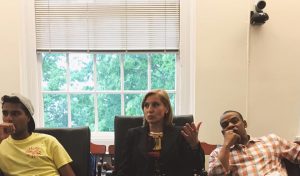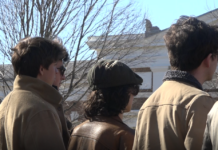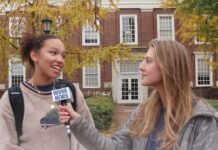
For his undergraduate thesis project, Arman Mottaghi conducted research on the experience of black students in the School of Engineering and Applied Science. Of the group of students he interviewed, over 50% believe the College of Arts and Sciences is more diverse and inclusive. This finding led Arman to assemble a meeting between students and administrators both affiliated and unaffiliated with the engineering school and facilitate a discussion about the potential for STS 1500, the only class that reaches all engineering students, to address issues of homogeneity and exclusion.
The administrators in attendance were: Chair of the Department of Engineering and Society W. Bernard Carlson, Associate Dean for Diversity and Inclusion John Gates, Director of Undergraduate Success Lisa Lampe, and Executive Associate Dean for Academic Affairs Maite Brandt-Pierce.
Arman opened the discussion with a brief introduction highlighting other major findings from his research then invited us to comment on the successes and failures of STS 1500. “Part of the issue [of STS 1500] is engineering students are encouraged to see themselves as observers as opposed to members of society,” fourth-year Petar Duric said. “When we are studying STS, we are actually studying ourselves.”
Fourth-year Sepehr Zomorodi suggested that STS courses should be made more available to students outside of the engineering school. “Everyone that has been in my [STS] class has been an engineering student. I’m curious as to why there aren’t students from the College. Technical trends are important for all members of society to understand,” Sepehr said.
Professor Carlson confirmed that all STS courses are, in fact, available to College students, and that a science and society course is required of all undergraduate students. However, class size and scheduling have been a couple limiting factors. The STS department realistically needs to expand in order to accommodate non-engineering students.
A first-year commented on the curricular homogeneity of STS 1500: “It was mostly about Western white guys. Could we offer more options?” Fourth-year Daniel Chen, who’s majoring in STS, conducted a study on STS courses at the 4500 and 4600 levels, which included 46 interviews with students within the School of Engineering and Applied Science (SEAS) class of 2016. His findings revealed that a devaluation of STS was common. According to Daniel, those who enjoyed STS “would preface their appreciation with something like ‘and by the way, this isn’t the norm. I’m an anomaly.’”
Dean Brandt-Pierce displayed results from the most recent alumni survey concerning STS. Of the 393 people interviewed, only 9% believed STS was “not important to my life”, while 37% believed it “adequately prepared” them for life after college and was “important to my life”.
“It doesn’t surprise me that people get [its importance] once they step out of the academic bubble here,” Sepehr commented, emphasizing how necessary it is for people to interact with the real world.
“There’s this pervasive attitude that everyone hates STS, so [those who like it] don’t talk about it for fear of being outed. I get it. [Engineers] don’t want to talk about religion. They don’t want to talk about race. They’re engineers. They don’t know how to talk about it,” remarked assistant STS professor Sean Ferguson, concluding with the point that there is a fundamental difference between what engineers like and what they need to learn.
Some suggested making the curriculum more interdisciplinary. I was reminded of a powerful statement my African American Studies professor, Sabrina Pendergrass, gave one day in class: “What’s the point of having the best doctors and engineers if they don’t know the first thing about values like justice, fairness, and equality?”
SEAS alums can do a stellar job of pitching a product, but can they speak with sophistication about structural racism, women and the male gaze, the interconnectedness of mechanical reproduction and capitalism, etc.?
Dean Gates found it worth clarifying that the mission of SEAS is simple.
“We are producing global engineering leaders.” Some found this mantra meaningless and problematic. Dean Gates, however, finds it compelling.
“Global means that we are connected to the world. Leadership implies stepping outside of our normative spaces. It gives students a sense of why they’re here, evoking the true nature of UVa.”
But Petar didn’t find this all too convincing, pointing out potential corporate implications.
“The mere fact that this institution was founded by the richest slave-owner is indicative of the cross-pollination of corporation and academia,” he said.
The points of disconnect within and between STS courses were also discussed. Some said that if the classes, as well as class components (lecture and discussion) had a more cohesive relationship to each other, students would have less difficulty paying attention and would find immediate value in the course material. Others, like Sepehr, explained that they had easily identified points of continuity.
Above all, what the department and indeed SEAS itself lacks is human interaction. Most engineering courses are short and held in large lecture halls consisting of up to 400 people. This is great for mass producing “global engineering leaders”, but not so great for training future generations of citizens.
















